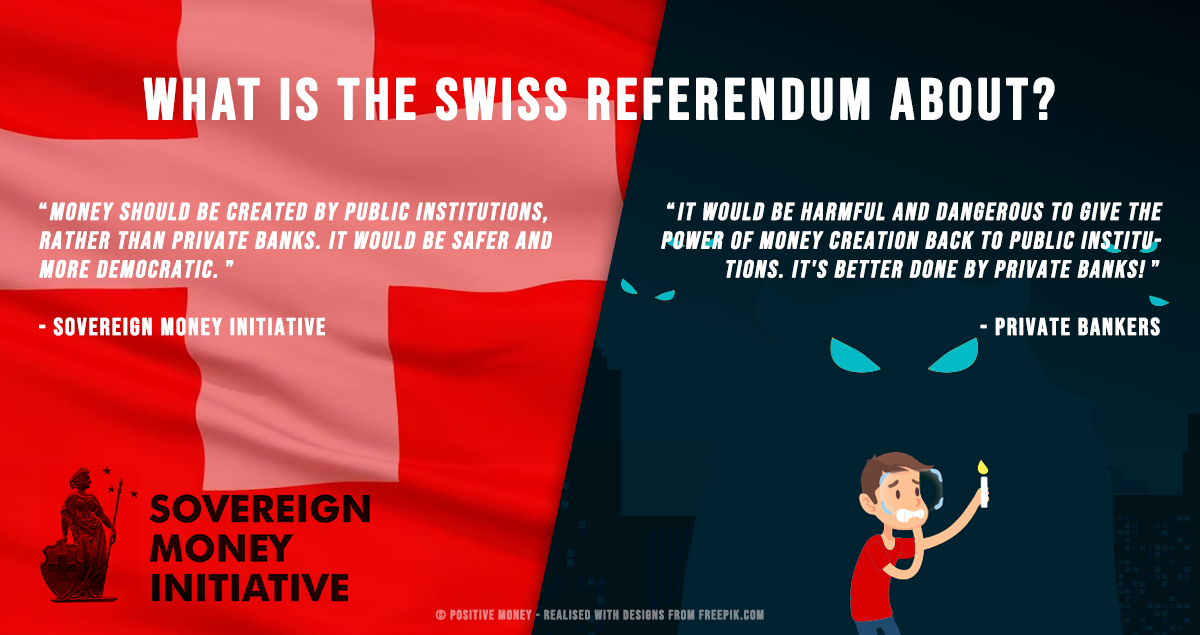Today Switzerland is holding a referendum concerning banking and the creation of money. BRAVE NEW EUROPE is posting two contrary articles in response to a piece in the Financial Times by MartinWolf on the topic (unfortunately with paywall). The other article in BRAVE NEW EUROPE, by Richard Murphy, is here.
David Shirreff is one of the founders and current editors of BRAVE NEW EUROPE. He is a former finance and business journalist at The Economist, author of “Break up the Banks!”, and playwright

It is good to see some lively debate on Positive Money spearheaded by Martin Wolf in the Financial Times. He says in an article on June 5th that he hopes the Swiss will vote positively in favour of what they call Vollgeld in a referendum on June 10th. The question to be answered is: “Who should create our [Swiss] francs: private banks or the Swiss National Bank [the central bank]?” Recent opinion polls suggest only 35% will vote in favour of the central bank.
Mr Wolf argues that finance needs change: “For that, it needs experiments.” Thomas Jordan, head of the Swiss National Bank says this is the wrong one: it would be an “unnecessary and dangerous experiment,” he told Bloomberg.
The Swiss Vollgeld-Intitiative is the Swiss version of Positive Money, a movement that very broadly favours reducing the power of private banks to determine the volume of credit. Positive Money argues that restricting the level of private-bank lending to the amount of “sovereign” money created by the central bank would keep a tighter rein on excessive lending and credit boom and bust.
A huge debate rages on what exactly a transition to this kind of financial system would mean, and whether it would serve mankind any better. Richard Murphy one of BNE’s regular writers believes PM’s ideas are badly wrong. Ralph Musgrave accuses him of failing to understand PM’s argument. Even the question of whether money is created as a “promise” or as a “payment” is a subject of fierce disagreement between the two. At the risk of alienating both formidable columnists I would timidly suggest it can be both, just as someone’s debit can be someone else’s credit.
Mr Murphy raises an eyebrow at Mr Wolf’s call for change, saying that he had his chance when sitting on Britain’s Independent Commission on Banking, which in September 2011 published “absurdly feeble and slow-paced recommendations for reform that the Tories adopted.” Mr Wolf confessed at the time that the commission had restricted itself to what it thought was “doable”. Advocating such a radical change as Vollgeld to the way British banks function would have sent Her Majesty’s Government into a tailspin. It’s good to see him declare his colours now.
It is perfectly understandable why Mr Wolf, PM and the Vollgeld-Initiative want changes to the system. Why should private banks, which have given us so much grief over the past 90 years, remain the chief arbiters of which sector gets credit and which does not? That is, they have tended to favour lending to property speculators, hedge funds and other such customers rather than to hardworking manufacturers and public-good enterprises.
But, reducing the banks’ power by insisting that lending policy is politically or centrally managed is fraught with its own dangers. Committees, whether elected, as in the case of politicians, or unelected, as in the case of central bankers, are nearly as likely as a herd of bankers to create a systemic problem. After all, they are human, unless AI can produce a superior systemic-risk-free algorithm.
Shifting lending policy to a centrally-determined mechanism is anathema to most economists. Even many of those who are sympathetic to PM’s goals, this writer included, fear the likelihood of unintended consequences. A Swiss experiment, without co-ordination with other major economies, could have a perverse effect on the Swiss economy or the Swiss franc.
But, let the debate continue, preferably without too much vitriol. As Mr Wolf says: finance needs experiments. Maybe Vollgeld should be tried out first in one of those legendary bunkers deep in the Swiss Alps.


Be the first to comment